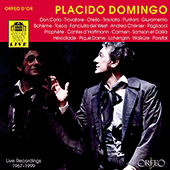
Jacques Offenbach (1819 - 1880)
The son of a Cologne synagogue cantor, Offenbach and his violinist brother Julius were trained at the Paris Conservatoire. Jacques Offenbach thereafter found employment as a cellist, initially at the Opéra-Comique. He developed a successful early career as a virtuoso on the instrument, for which he wrote a number of works, including a Concerto militaire and a concertino. He was for five years conductor at the Théâtre Français, but in 1855 he rented his own theatre, where his early light-hearted stage works were performed. He continued a successful career devoted largely to operetta and opéras comiques until his death in 1880.
Stage Works
Of nearly 100 lighter pieces for the stage, Orphée aux enfers (‘Orpheus in the Underworld’) is best known, in particular for its famous can-can. Other operettas include La belle Hélène (‘Fair Helen’) and La vie parisienne (‘Paris Life’). Of a weightier cast is Offenbach’s final opera, Les contes d’Hoffmann (‘The Tales of Hoffmann’), completed after the composer’s death by Bizet’s friend Guiraud and based, as the title suggests, on stories by E.T.A. Hoffmann, including the tale of Dr Coppelius and his life-like creation, the doll Coppélia.


























